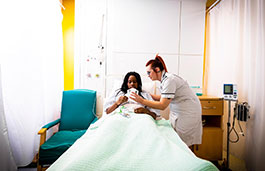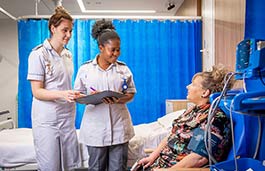Search
Operating Department Practice BSc (Hons)
Study level: Undergraduate
Operating Department Practice (ODP) is an exciting and rewarding career where you work within the perioperative theatre environment caring for patients undergoing surgery.
Year of entry
Location
Coventry University (Coventry)
Study mode
Full-time
Duration
3 years full-time
Course code
B991
Start date
September 2025
We are reviewing many of our School of Health and Care courses for 2025-26 entry to transform the teaching and learning. We are currently showing our 2024-25 course information, please keep checking back on this page to see our latest updates.
Course overview
Accredited by the Health and Care Professions Council (HCPC) enabling you to register as an operating department practitioner upon successful completion (additional requirements and costs may apply).
- Home students can apply to receive a payment of £5,000 a year through the NHS Learning Support Fund that does not need to be paid back, with additional bursaries for students incurring childcare costs6.
- State-of-the-art teaching facilities including mock operating theatre and scrub room, ambulance, high-tech manikins, hospital wards, critical care settings and other real-life environments relevant to practice.
Joint Top Modern University for Career Prospects
Guardian University Guide 2021 and 20225 QS Stars for Teaching and Facilities
QS Stars University RatingsTop 5 UK Student City (Coventry)
QS Best Student Cities Index 2023Why you should study this course
Operating Department Practitioners (ODPs) are a crucial part of the inter-professional team interacting and supporting a variety of patients throughout their perioperative journey. The role of the ODP is continually evolving beyond the borders of the operating department. ODPs are increasingly adapting their range of skills and abilities to develop their practice to work in non-traditional acute areas such as the emergency department, Interventional Radiology, cardiac catheterisation, MRI and CT scanning as well as endoscopy units.
- The skills you will learn and the knowledge you will gain will be facilitated through simulated activities such as role play and clinical skills development. These will take place in facilities which replicate those found in modern hospitals, include a mock operating theatre and scrub room, mock ward setting, high dependency bays, and utilising high-tech manikins which respond to the treatment provided.
- Teaching and learning is supported by highly trained, clinically current and experienced staff, clinical partners, service users and peer-supported learning both from fellow ODP students and inter-professionally with students from a range of health courses across the school. Our learning through exploration approach provides a hands-on style of learning which provides context and is designed to prepare you for real-world situations.
- Successful completion of the course will allow you to contribute fully as part of the perioperative multidisciplinary team in all areas of operating department practice. In the mandatory practice placements throughout your programme (sourced for you by the university), you will apply theory to practice on a daily basis, providing you with a platform to grow in confidence, develop your clinical skills and abilities to enable you to become a safe, confident and competent practitioner. As the course leads to eligibility to apply for professional registration with HCPC, you are required to meet attendance requirements both at university and on placement.
- This award leads to eligibility to apply for registration with the Health and Care Professions Council (HCPC) for registration as an ODP (subject to additional costs).
for Health Professions
Guardian University Guide 2023
Accreditation and professional recognition
This course is accredited1 and recognised by the following bodies:

Health and Care Professions Council
This course is accredited by the Health and Care Professions Council (HCPC) for the 2024/25 intake.

College of Operating Department Practitioners
This course has College of Operating Department Practitioners (CODP) accreditation for the 2024/25 intake.
What you'll study
Successful completion of the course will allow you to contribute fully as part of the perioperative multidisciplinary team in all areas of operating department practice. In the mandatory practice placements5, which are sourced for you by the university, throughout your programme you will apply theory to practice on a daily basis, providing you with a platform to grow in confidence, develop your clinical skills and abilities to enable you to become a safe, confident and competent practitioner.
As the course leads to eligibility to apply for professional registration with HCPC you are therefore required to meet attendance requirements both at university and on placement.
We regularly review our course content, to make it relevant and current for the benefit of our students. For these reasons, course modules may be updated.
How you'll learn
We aim to provide you with a range of learning environments and styles of teaching and learning which will suit the varied subject matter within the different modules and support your needs at all levels of the course. Teaching and learning will take place in the context of lectures, seminars, workshop activities and practice area placements, each supported by a comprehensive course of tutorial support.
These range from formally taught sessions to case studies, group work, online discussions, online quizzes and practical hands-on sessions in our state-of-the-art facility with a mock operating theatre and scrub room which is equipped with a range of equipment you would expect to be exposed to, and use on a daily basis, in a real operating theatre.
You will normally have around 15 hours per week contact time, which consists of a mixture of lectures, workshops and practical skills sessions in our clinical simulation areas. In addition, you will be expected to undertake a further 20-25 hours minimum of self-directed study each week.
The contact hours may be made up of a combination of face-to-face teaching, individual and group tutorials, and online classes and tutorials.
As an innovative and enterprising institution, the university may seek to utilise emerging technologies within the student experience. For all courses (whether on-campus, blended, or distance learning), the university may deliver certain contact hours and assessments via online technologies and methods.
In response to the COVID-19 pandemic, we are prepared for courses due to start in or after the 2023/24 academic year to be delivered in a variety of forms. The form of delivery will be determined in accordance with Government and Public Health guidance. Whether on campus or online, our key priority is staff and student safety.
Assessment
This course will be assessed using a variety of methods which will vary depending upon the module.
Assessment methods include:
- Academic coursework
- Online examinations
- Viva voce (oral interviews/discussions)
- Objective Structured Clinical Examinations (OSCE)
- Poster presentations (individual and group)
- Work-based practical observations.
The Coventry University Group assessment strategy ensures that our courses are fairly assessed and allows us to monitor student progression towards achieving the intended learning outcomes.
International experience opportunities
Our course provides international learning experiences to help prepare you for the global employment market as well as strengthen and develop your broader intercultural, personal and professional skills2.
I am proud to be a part of the team that helps our students become confident and competent practitioners. Here at Coventry, we are an enthusiastic teaching team all with a wealth of experience to assist your learning and development. We are lucky to have use of the amazing facilities which allows us to simulate real life situations in a safe and controlled environment.
George McSharry, lecturer, quoted in 2022
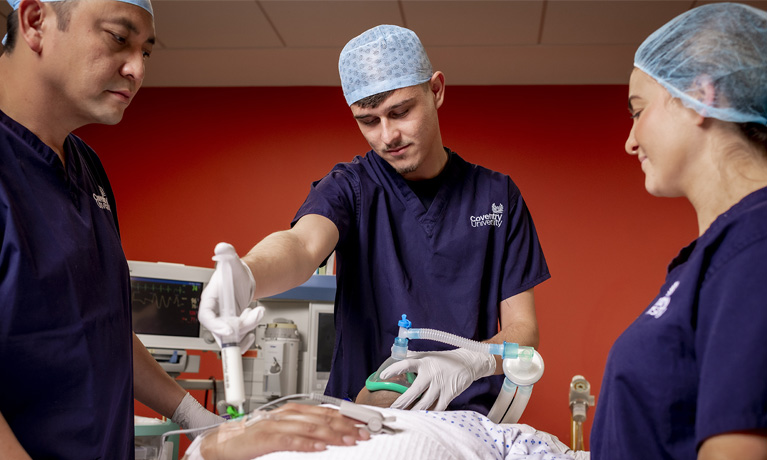
Entry requirements
Typical offer for 2024/25 entry.
Fees and funding
2024/25 tuition fees.
| Student | Full-time | Part-time |
|---|---|---|
| UK, Ireland*, Channel Islands or Isle of Man | 2025/26 fees TBC 2024/25 fees - £9,250 per year |
Not available |
| EU | 2025/26 fees TBC 2024/25 fees - £9,250 per year with EU Support Bursary** 2025/26 fees TBC 2024/25 fees - £19,850 per year without EU Support Bursary** |
Not available |
| International | 2025/26 fees TBC 2024/25 fees - £19,850 per year |
Not available |
A non-repayable grant of £5,000 and extra payments worth up to £3,000 may be available to eligible home students for each year of study. Read more about this in the NHS Learning Support Fund information booklet.
For advice and guidance on tuition fees and student loans visit our Undergraduate Finance page and see the university’s Tuition Fee and Refund Terms and Conditions.
We offer a range of International scholarships to students all over the world. For more information, visit our International Scholarships page.
Tuition fees cover the cost of your teaching, assessments, facilities and support services. There may be additional costs not covered by this fee such as accommodation and living costs, recommended reading books, stationery, printing and re-assessments should you need them. Find out what's included in your tuition costs.
*Irish student fees
The rights of Irish residents to study in the UK are preserved under the Common Travel Area arrangement. If you are an Irish student and meet the residency criteria, you can study in England, pay the same level of tuition fees as English students and utilise the Tuition Fee Loan.
**EU Support Bursary
Following the UK's exit from the European Union, we are offering financial support to all eligible EU students who wish to study an undergraduate or a postgraduate degree with us full-time. This bursary will be used to offset the cost of your tuition fees to bring them in line with that of UK students. Students studying a degree with a foundation year with us are not eligible for the bursary.
Facilities
Our multi-million-pound Alison Gingell Building features a range of mock healthcare settings, including hospital wards, ambulance, therapy suites and community houses, giving you the opportunity to replicate real-life situations before you go on placement4.
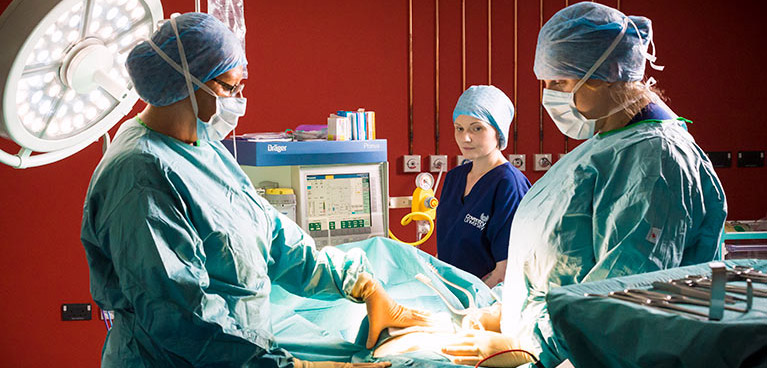
Mock operating theatre
Our operating theatre is set up to accommodate procedures that would take place during hospital surgery. It includes a scrub room and the machines, equipment and lighting you will need to use to be an effective operating department practitioner.
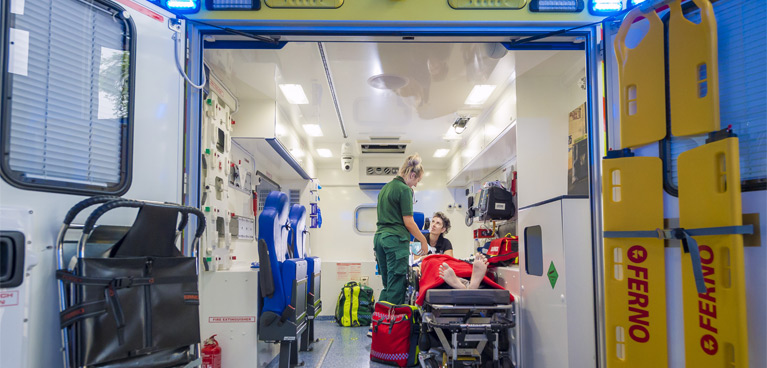
Alison Gingell Building
Our state-of-the-art Alison Gingell Building features a mock ambulance, high-tech manikins, hospital wards, critical care settings and therapy suites. This gives you the opportunity to learn in situations that mirror real life scenarios.
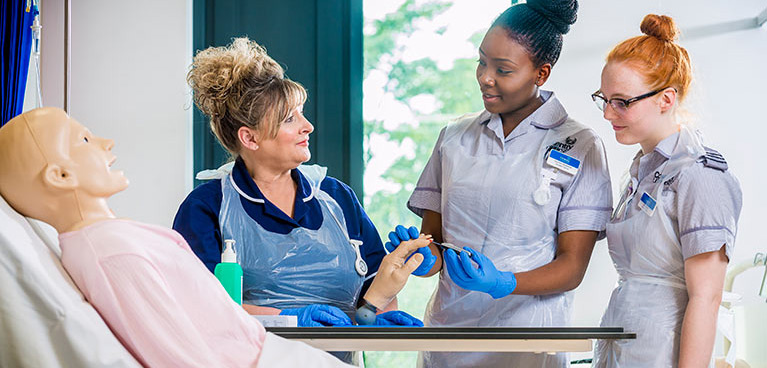
Mock hospital wards
We have two fully-equipped mock hospital wards, each containing 4 beds. The wards are built to NHS standards and contain moveable beds, first aid equipment and patient monitoring tools, so that you can study a complete patient pathway.
Careers and opportunities
Our ‘learning through exploration’ approach is designed to prepare you for real-world situations, and using the mock operating theatre and scrub room will provide the opportunity to undertake realistic scenarios before you go onto your placements.
Your mandatory practice placements5 (sourced for you by the university) enable you to apply theory to practice on a daily basis, providing you with a platform to grow in confidence, develop your clinical skills and abilities to enable you to become a safe, confident and competent practitioner.
ODPs are sought-after employees and we provide support for all Coventry University graduates to help them secure employment on completion of the course.
Where our graduates work
Past graduates have found work in the perioperative environment in both the NHS and private sector in anaesthetics, surgery and post-anaesthetic care environments.
Graduate Immigration Route visa
Based on current information from the UK Government, international students whose study extends beyond summer 2021 may be eligible for a visa under the UK Government’s Graduate Immigration Route, which will enable students to stay and work, or look for work, in the UK at any skill level for up to two (2) years. Check the most up to date guidance available to check your eligibility and any updates from the UK Government before making an application or enrolment decision.
How to apply
You may also like
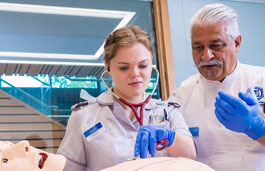
Adult Nursing BSc (Hons)
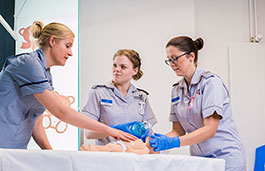
Children and Young People's Nursing BSc (Hons)
